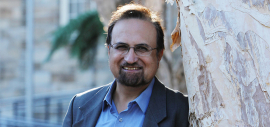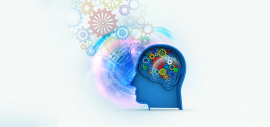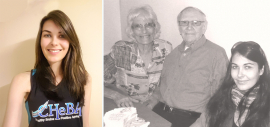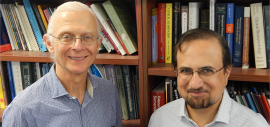Blog: The Brain Dialogues, filtered by tag: Professor Perminder Sachdev AM
Joining Team CHeBA for Positive Brain Ageing a Family Affair
KATE CROSBIE
Dave Brodaty, son of CHeBA Co-Director Professor Henry Brodaty, is optimistic about the future of brain ageing.
“It is apparent even through Henry’s medical career that our understanding of brain ageing and the medical responses to it have developed considerably,” says Dave.
“Being the eternal optimist, I am confident that with the great minds researching this area, even though a cure may not be attainable yet, the course of brain ageing will be dealt with much better – and become far less of an unknown.”
This is the first year Dave will be entering the City 2 Surf, alongside… Read More
What is Successful Ageing?
PROFESSOR PERMINDER SACHDEV, MD, PhD
"How old would you be if you didn't know how old you were?" Satchel Paige (1906-1982)
A great demographic change of the last century has been the ageing of our population. The good news is that we are increasingly living to an older age. At present, about 15% of Australians are aged 65 years or over, and this proportion is likely to be nearly 25% by the middle of the century. A girl born today can expect to live to the age of 94 years and a boy to the age of about 92 years. An increasing number of older people are over the age of 80 years, which is… Read More
Suicide and Middle Aged Men
HEIDI DOUGLASS | h.douglass@unsw.edu.au
Since the devastating death of respected American comedian Robin Williams nearly three weeks ago, the internet has been rife with speculation on the underlying factors behind this tragedy. Respectfully, this conjecture should be left as a matter for his family and physicians, but what the rest of us can do to honour this remarkable personality who warmed the hearts of many generations is strive to increase awareness and understanding of clinical depression and its significant relationship to brain diseases and ageing.
In a recent interview with SBS… Read More
The Good-ish News About Alzheimer's Disease
ADELE HORIN
Of all the things Australians fear, cancer is number one and dementia is number two. For me the order is reversed. I’ve had cancer (radiation, chemotherapy, lumpectomy). I’ve seen people die of cancer. It’s not easy or pretty. But I’ve also seen people die slowly of dementia – whether Alzheimer’s disease or vascular dementia, it doesn’t matter. Dementia holds a particular horror because it robs people of their intellect, their personality, their memory, their speech, their essential self. Cancer sufferers, on the other hand, remain recognisably themselves through the experience,… Read More
Exercising the Mind
STEPHANIE CAMPBELL, CHeBA CHAMPION (FITNESS AMBASSADOR FOR CHeBA)
I’m jogging up a ridiculously steep street in Sydney’s leafy, bayside suburb of Mosman. My knees ache, my quads are burning, and my lungs hurt from straining for air. No point pretending – I hate uphill. Forehead glistening with sweat, I grit my teeth and finally reach the crest, attempting to breathe through a massive stitch in my side as I take the pace back down to a steady walk to recover. The oversized Garmin fitness watch strapped to my left wrist bleeps encouragingly at me to signal I’ve covered another kilometre, and… Read More
CHeBA Turns One - Our Mission
PROFESSOR PERMINDER SACHDEV and PROFESSOR HENRY BRODATY, CO-DIRECTORS, CHeBA
There is a worldwide effort to identify risk and protective factors, establish biomarkers and develop novel treatments for mild cognitive impairment (MCI), dementia and geriatric depression.
Over the last decade, our group has been a leading contributor to this effort. We established five longitudinal studies of cognitive ageing and dementia along multiple lines of investigation which include neuroepidemiology, neuropsychology, neuroimaging, genetics/genomics, proteomics, stem cells, metabolomics and… Read More
Donating Your Brain to Research
HEIDI DOUGLASS | h.douglass@unsw.edu.au
There are currently approximately 320,000 people in Australia with dementia, with that number set to rise to almost one million by 2050, and 115 million globally. These predictions mean that not only do we need a clear plan to make care available for so many people with dementia, but we also need to pursue prevention strategies vigorously.
Prevention of dementia depends largely upon research, and beyond the necessities of funding, equipment, and academics with the right skill base to perform the research we need one extra thing: brains.
"Even before… Read More
Is the Incidence of Dementia Declining?
PROFESSOR PERMINDER SACHDEV, MD, PhD
It’s rare to hear good news about dementia, so two recent reports showing it may be becoming less common created a fair amount of excitement.
Not a week goes by without some new promised therapy for dementia having failed in a clinical trial. The joke in dementia circles is that “the cure for dementia is only five years away, but will always remain five years away”. But things perked up considerably when the reports in the prestigious medical journal Lancet showed that dementia rates seem to be declining.
Study on Prevalence
The first report was from… Read More
Running for Healthy Brain Ageing
PROFESSOR HENRY BRODATY, MD, PhD
This article was originally published in the August edition of Montefiore LIFE Magazine.
When I first started working as a doctor in 1970, Alzheimer's disease was thought of as a rare disease only affecting people under the age of 65 years. No-one was much interested in older people with brain disease or mental illness and they were all lumped together under a diagnosis of senile psychosis or senile dementia. Hasn't the world changed! No-one had heard of Alzheimer's disease 40 years ago. Now it is a household word and what people fear most (along with… Read More
Staying Connected Online is a No Brainer
HEIDI DOUGLASS | h.douglass@unsw.edu.au
This article was originally published in Simply Connected on the Tapestry website.
Can staying connected with your friends online keep your brain young?
Research indicates that social activity, in combination with a healthy lifestyle and brain training, actually restores and improves brain function.
In many countries we are ageing at an astonishing rate. For example, in the US, the number of individuals aged 90 years and over is predicted to increase from the current 2 million to more than 8 million by 2050.
Centenarians (those that attain the age… Read More










